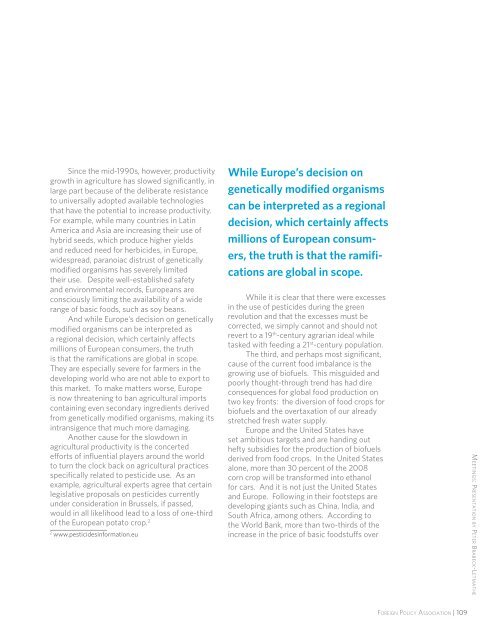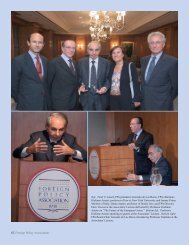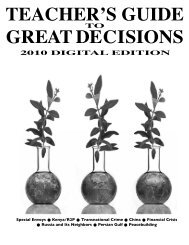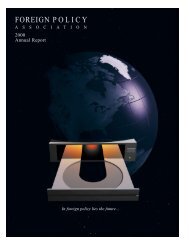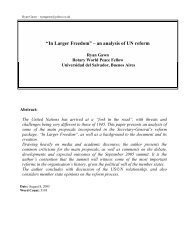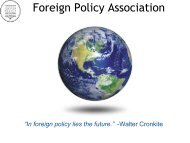Celebrating 90 Years - Foreign Policy Association
Celebrating 90 Years - Foreign Policy Association
Celebrating 90 Years - Foreign Policy Association
You also want an ePaper? Increase the reach of your titles
YUMPU automatically turns print PDFs into web optimized ePapers that Google loves.
Since the mid-19<strong>90</strong>s, however, productivity<br />
growth in agriculture has slowed significantly, in<br />
large part because of the deliberate resistance<br />
to universally adopted available technologies<br />
that have the potential to increase productivity.<br />
For example, while many countries in Latin<br />
America and Asia are increasing their use of<br />
hybrid seeds, which produce higher yields<br />
and reduced need for herbicides, in Europe,<br />
widespread, paranoiac distrust of genetically<br />
modified organisms has severely limited<br />
their use. Despite well-established safety<br />
and environmental records, Europeans are<br />
consciously limiting the availability of a wide<br />
range of basic foods, such as soy beans.<br />
And while Europe’s decision on genetically<br />
modified organisms can be interpreted as<br />
a regional decision, which certainly affects<br />
millions of European consumers, the truth<br />
is that the ramifications are global in scope.<br />
They are especially severe for farmers in the<br />
developing world who are not able to export to<br />
this market. To make matters worse, Europe<br />
is now threatening to ban agricultural imports<br />
containing even secondary ingredients derived<br />
from genetically modified organisms, making its<br />
intransigence that much more damaging.<br />
Another cause for the slowdown in<br />
agricultural productivity is the concerted<br />
efforts of influential players around the world<br />
to turn the clock back on agricultural practices<br />
specifically related to pesticide use. As an<br />
example, agricultural experts agree that certain<br />
legislative proposals on pesticides currently<br />
under consideration in Brussels, if passed,<br />
would in all likelihood lead to a loss of one-third<br />
of the European potato crop. 2<br />
2 www.pesticidesinformation.eu<br />
While Europe’s decision on<br />
genetically modified organisms<br />
can be interpreted as a regional<br />
decision, which certainly affects<br />
millions of European consumers,<br />
the truth is that the ramifications<br />
are global in scope.<br />
While it is clear that there were excesses<br />
in the use of pesticides during the green<br />
revolution and that the excesses must be<br />
corrected, we simply cannot and should not<br />
revert to a 19 th -century agrarian ideal while<br />
tasked with feeding a 21 st -century population.<br />
The third, and perhaps most significant,<br />
cause of the current food imbalance is the<br />
growing use of biofuels. This misguided and<br />
poorly thought-through trend has had dire<br />
consequences for global food production on<br />
two key fronts: the diversion of food crops for<br />
biofuels and the overtaxation of our already<br />
stretched fresh water supply.<br />
Europe and the United States have<br />
set ambitious targets and are handing out<br />
hefty subsidies for the production of biofuels<br />
derived from food crops. In the United States<br />
alone, more than 30 percent of the 2008<br />
corn crop will be transformed into ethanol<br />
for cars. And it is not just the United States<br />
and Europe. Following in their footsteps are<br />
developing giants such as China, India, and<br />
South Africa, among others. According to<br />
the World Bank, more than two-thirds of the<br />
increase in the price of basic foodstuffs over<br />
FOREIGN POLICY ASSOCIATION | 109<br />
MEETINGS: PRESENTATION BY PETER BRABECK-LETMATHE


